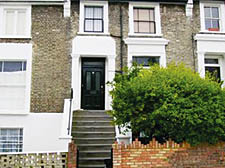| |

One Camden street property offered for sale this year |
This is not the time to be flogging off the family silver
Home ownership is now restricting social mobility, argues Robert Latham, Legal Aid Lawyer of the Year and former Camden Labour councillor
WHEN I was a ward councillor for Regent’s Park between 1982 and 1990, council housing was still an alternative form of tenure of choice.
During the 1970s, John Mills, as chair of housing in Camden, had municipalised much of the run-down privately rented accommodation.
Camden’s social diversity was demonstrated by streets with roughly equal numbers of owner-occupied, socially rented and privately rented accommodation.
All this has now changed. Street properties that were once occupied by council tenants have been siphoned off into owner-occupation through the Right to Buy.
The stock of social housing has not been replenished and the borough has increasingly become the preserve of the rich and the poor, while middle Camden has been forced out of the borough.
Those council tenants who sought to participate in the financial bonanza by acquiring leasehold interests in their flats on Camden’s estates are now discovering the harsh reality of large bills for service charges and ownership of an “asset” which cannot be sold.
Home ownership now restricts social mobility.
Both the Conservative and New Labour governments purported to offer council tenants empowerment and choice.
But their obsession with private finance meant that government dictated the “choice” that was offered.
If tenants wanted their homes improved they had to vote for private finance initiatives, stock transfers to registered social landlords (RSLs) or arm’s-length management organisations (Almos).
In 2003, Camden’s tenants voted against proposals for an Almo in favour of the “fourth option”, namely staying with the council.
Tenants voted in the knowledge of the financial consequences, namely that Camden would have no capital resources for improvements.
Labour lost political control of Camden in May 2006.
The Liberal Democrat/ Conservative coalition is now selling off prime street properties to fund works to bring the remaining stock up to the Decent Homes standard.
In the current state of the property market, it is a most unfortunate time to flog off the family silver.
The coalition lack any clear vision of the role of social housing in Camden.
Last July, Gordon Brown announced an ambitious programme of new affordable housing.
It is one of the ironies of history that the current financial melt-down ensures that this will be almost impossible to achieve.
As a result of the deregulation of the financial institutions, large City bonuses were earned through the irresponsible manipulation of the housing market.
It is now here that the pain is greatest, particularly for home owners.
On Monday, the Tenants Service Authority replaced the Housing Corporation as the regulator of RSLs.
Over the year ahead it will be consulting on a new regulatory framework to achieve a level playing field between tenants of local authorities and RSLs.
A housing Green Paper is promised for the new year. It has been delayed since a new realism has removed some of the more barmy ideas that were being debated by social landlords, such as scrapping tenancies for life or evicting tenants who fail to find employment.
It looks increasingly likely that the next general election will coincide with the local elections in May 2010.
The recession should focus our minds on the extent to which private finance has become the master rather than the servant of government.
We should welcome the opportunity for a lively debate as to the role of social housing and how local and central government can best work in partnership to achieve these policy objectives.
The extent to which the government, or indeed the other political parties, will now embrace the “fourth option” remains unclear.
|
 |
|
 |
| |
| |